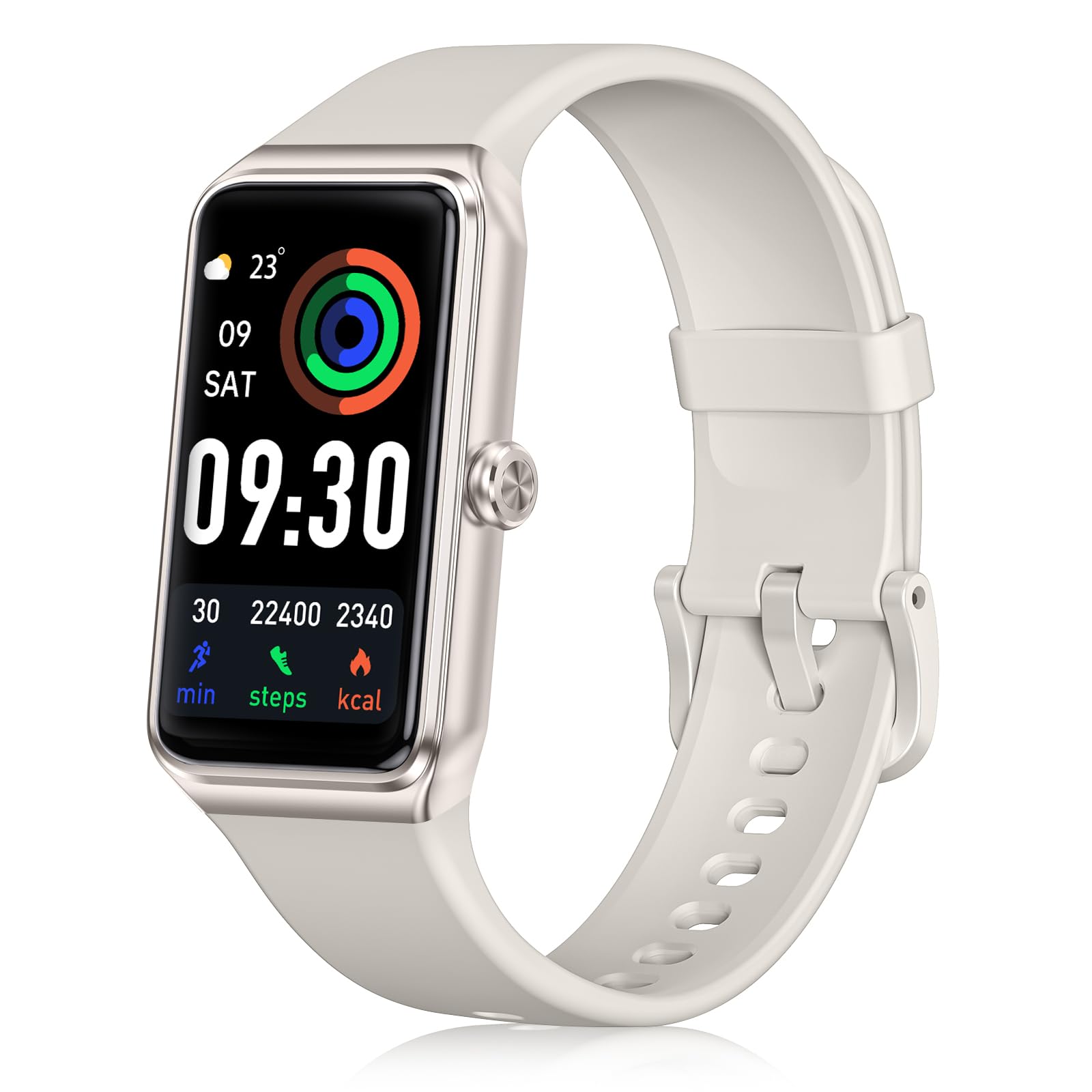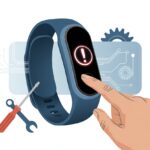We all know we should move more, but honestly, counting steps on our fingers gets awkward fast. That’s where fitness trackers step in. They’re like little cheerleaders on our wrists, counting steps, tracking sleep, and buzzing now and then to remind us to stand up and pretend we’re athletic.
Fitness trackers come in all sorts of shapes and sizes. If you’re on a budget (or just don’t want to drop more cash than you’d spend on a nice dinner), you might assume you’re stuck with some glorified rubber band. But nope—there are actually a bunch of solid trackers under $100 that count steps, monitor your heart rate, and even guilt you into walking that extra block.
When we shop for a fitness tracker, we look for things like battery life, display clarity, accuracy, and app support. Some double as watches, while others keep it super simple. The trick is picking one that keeps you motivated and doesn’t fall apart after your second sweaty walk around the block.
We spent hours researching and testing popular models under $100 to find the ones that actually help you get moving—without torching your wallet.
Best Fitness Trackers Under $100
Let’s be honest, most of us want to get fit without blowing the whole paycheck. Luckily, there are some good fitness trackers that keep us on track and still leave enough room in the budget for tacos. Here are our favorites that keep our wallets and our steps in check.
Fitbit Inspire 3
If you want affordable health data on your wrist that won’t make your wallet cry, Inspire 3 is a solid pick.
Pros
- Tracks heart rate, sleep, and stress in one slim band
- So lightweight you’ll probably forget you’re wearing it
- Battery lasts long enough that you’ll wonder if it charges itself
Cons
- GPS only works if you keep your phone nearby
- Some health features hide behind a paid subscription
- Syncing with the app can test your patience (maybe grab a snack)
When we first strapped the Fitbit Inspire 3 on, we braced ourselves for a clunky feel, but it surprised us. It’s slim, comfy, and so featherweight that we kept checking to make sure it hadn’t disappeared.
After a week of use, we tracked steps, heart rate, sleep, and even stress—though, let’s be real, it can’t help with our stress about laundry. The touchscreen’s bright and customizable, so we didn’t feel like we’d borrowed tech from our parents.
If you want to use GPS for runs or hikes, you’ll need to bring your phone along. And some of the fancier features like detailed sleep insights and readiness scores want a subscription after the trial. But for basic tracking and style, this tracker does plenty. For anyone trying to get healthier (or just count steps during grocery store laps), Inspire 3 is an easy recommendation.
Fitbit Inspire 3
If you want to count steps while dodging puddles and ignoring texts from your boss, Inspire 3 deserves a serious look.
Pros
- Insanely comfortable—so light you’ll almost forget it’s there (until you hit your step goal)
- Sleep tracking is almost too accurate (it knows about those midnight snack runs)
- Battery lasts so long you’ll forget where the charger is
Cons
- No full message previews—guess you’ll miss the group chat drama
- Touchscreen sometimes thinks you’re working out when you’re just grabbing snacks
- No built-in GPS, so your phone has to tag along for jogs (sorry, pockets)
We put on the Fitbit Inspire 3 and instantly felt like fitness pros—even though our marathon is more Netflix than running. The band’s slim and light, so it never gets in our way, whether we’re typing or folding laundry.
For workouts (or just walking to the fridge), the heart rate and activity tracking keep us honest. The sleep analysis is a highlight—who doesn’t want to know if “five more minutes” helps or hurts? Seeing our restless tossing mapped out made us question some life choices, but at least we know.
Notifications buzzing on our wrist mean we can ignore that group chat and focus on fitness (or our nap). Would we trade our Inspire 3 for anything else in this price range? Probably not. It doesn’t have every feature, but it nails the basics and doesn’t die after one workout. For those of us who forget to charge, forget to exercise, and sometimes forget what day it is, that’s a win.
Fitbit Inspire 2
If you want a fitness tracker under $100 that doesn’t bombard you with confusing features and still keeps you moving, the Fitbit Inspire 2 just works for most people.
Pros
- Simple enough for anyone—even if tech isn’t your thing
- Tracks steps, sleep, and heart rate without nagging
- Battery goes for ages (almost 10 days, which feels like forever)
Cons
- Some Premium features vanish after the first year unless you pay
- Screen is tiny, so reading messages can be a squint-fest
- Needs a Google account, so…another password to forget
Swapping out our old step-counter for the Inspire 2 felt like trading a flip phone for a smartphone. It’s light, slim, and comfy enough to forget you’re wearing it—until it vibrates to get you off the couch.
The step and sleep tracking made us face our lazy habits. There’s a weird satisfaction in hitting daily step goals, even if most steps are just us looking for our coffee mug. Heart rate tracking feels pretty accurate for this price. We checked our stats after a walk (or, let’s be honest, a stroll).
Notifications for calls and texts come in handy, but the small screen makes reading them a bit of a guessing game. The free year of Fitbit Premium is a nice bonus. Some of us got hooked on the insights, and some just liked collecting badges for walking to the fridge. After the trial, you’ll have to decide if Premium’s worth it. For a tracker under $100, Inspire 2 ticks most boxes—if only it could help us find our lost motivation.
Fitbit Inspire HR
We’d hand this tracker to anyone who wants to keep tabs on their health without Googling “how to charge a fitness band” every other night.
Pros
- All-day heart rate tracking—so you can see how nervous you get before meetings
- Clean, light design—no one’s asking if you’re wearing a calculator
- Sleep tracking tells you exactly how little you’re actually sleeping
Cons
- No GPS—so you’ll just have to trust us when we say we ran that extra mile
- Sometimes thinks stapling papers counts as exercise (hey, maybe it does)
- The monochrome screen won’t wow smartwatch fans
Wearing the Fitbit Inspire HR, we felt like we were in on a health secret. It’s honestly simple to use. Once we adjusted the strap (two sizes in the box), we barely noticed it… until we saw our step count after chasing the bus.
The heart rate tracking is a standout. There’s something satisfying about seeing a number confirm that waiting in line for coffee is, in fact, stressful. Sleep tracking is another bonus; apparently, scrolling TikTok until midnight isn’t great for “deep sleep.” Who would’ve guessed?
You won’t get GPS, and the screen won’t impress anyone, but for under $100, the Fitbit Inspire HR does what we actually need—and doesn’t require a loan for a charger. It’s not flashy, but it had our backs (and our wrists) all week.
Amazfit Band 7
If you want a budget fitness tracker that lasts longer than a loaf of bread and doesn’t look like a toy, the Amazfit Band 7 is a safe bet.
Pros
- Battery life that goes for weeks—no frantic nightly charging
- Tracks a wild number of sports and basic health stats
- Big, clear screen for tired eyes
Cons
- The band clasp could definitely use a redesign
- Alexa features feel half-asleep
- Sleep tracking sometimes gets confused by naps on the couch
We slipped on the Band 7 and instantly felt like we’d leveled up—at least until we remembered we still had to exercise. The screen is huge for a band, making it easy to check heart rate, steps, or even stress.
With 120 sports modes, we can finally track “professional thumb wrestling” (if only that counted). The battery life is a relief; we went almost two weeks before it even hinted at a low charge. Sensors seemed accurate, and the sleep tracking gave us the harsh truth about our habits (spoiler: not great).
There’s room for improvement, though. Clasping the band with one hand is a test of patience. Alexa works, but it’s so slow we sometimes forgot what we wanted to ask. And don’t expect it to catch short catnaps; it’s really only good for full nights.
For gym-goers and regular folks who want solid fitness features on a budget, the Amazfit Band 7 is a good pick—just don’t expect it to come up with excuses for skipping leg day.
Amzhero Health Fitness Tracker
If you want a tracker with loads of features but don’t want to sell a kidney, this one keeps your dignity (and organs) safe.
Pros
- Checks heart rate, blood oxygen, and sleep (because apparently, we all need a little supervision)
- Lasts up to two weeks per charge, so you can forget it’s even there
- Survives sweat, rain, and those “oops” swimming moments
Cons
- Syncing with phones feels about as smooth as a middle school dance
- Button controls act more stubborn than your alarm clock
- Notifications show up a bit late or seem limited
Let’s just say it: you’re not getting a personal fitness coach here. But for under $100, you basically get a mini health detective on your wrist.
Ever wonder what your heart’s doing while you’re avoiding burpees? This tracker’s got you. It checks blood oxygen, sleep, even stress—finally, something’s judging us that isn’t our cat.
Battery life surprised us. We wore it for days, sometimes swapping bands just to pretend it was new, and it kept going. Washing dishes, walking in the rain, or “accidentally” falling in a pool—this tracker handled it, thanks to waterproofing.
Setting it up gave us a headache. Pairing to our phones felt like a trust fall, but with random Bluetooth issues and app updates. We also had to get used to pushing buttons instead of just tapping the screen.
If you want affordable health tracking and can deal with a few quirks, the Amzhero Health Fitness Tracker could be the gym buddy you didn’t know you needed.
Auxiou Smart Fitness Tracker
If you want a smart fitness tracker that covers all the basics (and a bit more), Auxiou’s affordable band probably deserves a spot on your wrist.
Pros
- Tracks way more workouts than most of us will ever attempt
- Comfortable and light enough to forget you’re wearing it
- Battery keeps up with you for nearly a week
Cons
- Notification alerts sometimes get a little too excited
- Display loves fingerprints
- Stress tracking feels a bit vague sometimes
Right away, we noticed it looks cleaner and fancier than we expected for the price. The screen is bright, and you can actually read your stats on the go—not just guess at them.
Swapping watch faces is fun, though we might’ve lost too much time picking our favorite.
We put Auxiou through walks, living room dance breaks, and a questionable yoga attempt. The tracker kept up, no matter what “exercise” looked like for us.
With 104 sports modes, even our weird hobbies made the list.
Wearing it around town or overnight, we barely noticed it. The battery lasted almost a week before we remembered to charge it.
The only real hiccup? Notification buzzes sometimes show up at the worst moments.
Still, for the price, this watch checks almost every box for a fitness buddy.
FITVII Health & Fitness Tracker
If you want a tracker that acts like a personal assistant but doesn’t empty your wallet, this is a solid pick.
Pros
- Lets you make and take calls—finally, your wrist has real power
- Tracks heart rate and sleep every hour, so you can brag about your “rest” (even if it’s just wishful thinking)
- Survives sweaty runs and accidental rain dances without a fuss
Cons
- Icons on screen are tiny—like, squint-level tiny
- Plastic band isn’t great if you’ve got hairy wrists
- Health info is fun, but it won’t replace your next doctor’s visit
Wearing the FITVII smartwatch, we actually kept up with steps, water intake, and those suspiciously long couch naps. The sleep tracking feature gave us data we could use, so now we know why coffee sometimes just doesn’t cut it.
Honestly, making calls from the wrist made us feel like secret agents.
This tracker really shines with its endless activity modes—if you can spell the sport, it probably tracks it. Setting reminders for movement and water made it harder to forget to get up.
On-wrist notifications meant we could leave our phones behind for quick walks.
We did find the tiny icons frustrating at times—maybe we need smaller fingers? The plastic band isn’t for everyone, especially if you’re not a fan of wrist hair tangles.
For less than $100, FITVII packs in so many features that we barely got through them all before the battery needed a recharge. If you want “smart and sporty” without breaking the bank, this one’s a strong contender.
Wontrum Fitness Tracker
Here’s a budget fitness tracker that almost makes us feel like pro athletes—minus the exhausting workouts.
Pros
- Bright, customizable screen with more watch faces than anyone needs
- Tracks an impressive number of workouts (seriously, we counted)
- Week-long battery means less charging, more pretending to exercise
Cons
- The pink color isn’t everyone’s cup of protein shake
- Notifications can get a bit chatty
- Touchscreen sometimes wants a second tap (moody, much?)
Wontrum’s Fitness Tracker is like that reliable gym buddy who shows up but doesn’t judge you for skipping leg day. We noticed the HD full-touch display right away—it’s clear, colorful, and we probably spent too long picking watch faces.
With over 200 options, even our indecisive side felt spoiled.
Tracking more than 100 exercise modes sounds like overkill, but if you mix jogging with the occasional “advanced” power walk, it’s handy. Heart rate, sleep, and even blood pressure monitoring worked well for us, especially when we needed proof for why we felt so tired by 8 p.m.
Wearing it all week without charging made us feel like productivity champs, and splashing water on it in the sink didn’t hurt it. Floods of notifications can get annoying, but we quickly learned to limit them (sorry, group chats).
If you can get past the peppy pink color—and a screen that sometimes wants a gentle nudge—this tracker is worth tossing into your fitness routine.
FITVII Ole Tracker
If you want a budget-friendly tracker with a sharp screen and health features, this one does the job without making your wallet cry.
Pros
- The display is super clear and colorful
- Checks blood pressure and blood oxygen, so you can play doctor at family dinners
- Waterproof—great for anyone who forgets to take it off before showering
Cons
- The strap picks up more dirt than a toddler at the playground
- Some features don’t work unless you use the app
- No built-in GPS, so your wild running routes stay your little secret
Right away, the FITVII Ole’s big, bright screen stands out—it actually looks fancy on your wrist, especially for this price. You can scroll through basic fitness info, like steps and calories, and even check heart rate and blood oxygen without digging through menus.
Setting the time without an app is a breeze, even if you’re not a tech wizard.
We tried wearing it all day (and accidentally all night). Sleep tracking worked surprisingly well, and we got to brag about how little deep sleep we’re getting.
All-day activity tracking just does its thing in the background, never judging you for skipping leg day or logging “walking to fridge” as exercise.
Wearing the FITVII in the shower didn’t ruin it, though we quickly realized the strap loves collecting stains. Our advice? Maybe don’t wrestle with ketchup while wearing this.
Overall, it’s a solid pick for anyone starting a fitness journey—or anyone who just likes colorful numbers on their wrist.
Buying Guide
Shopping for a fitness tracker under $100 feels a bit like picking out a new pet—except there are fewer furballs and, hopefully, more step counts.
It’s best to look for features that actually help us out, not just extra buttons to fumble with.
Battery Life:
Honestly, who wants to charge their tracker every single night? Check battery life before buying, or your tracker might end up napping more than you do.
Water Resistance:
Some of us sweat buckets. Others forget to take things off before jumping in the shower. Either way, water resistance is pretty much essential.
Comfort:
If it feels like a little robot’s squeezing your wrist, you probably won’t wear it much. Lightweight, smooth bands always win.
Display:
We want to glance at the screen and actually see something, right? Clear, bright displays make a world of difference, especially when your arms are swinging around.
Activity & Health Tracking:
Look for trackers that can handle steps, heart rate, and sleep monitoring. Feeling adventurous? Maybe even try calorie counting.
Here’s a quick table to help us compare:
| Feature | Why It Matters |
|---|---|
| Battery Life | Tracks longer, charges less |
| Water Resistance | For sweaty days or showers |
| Comfort | No wrist-pinching allowed |
| Display | For quick, easy reading |
| Tracking | Steps, heart, sleep, calories |
Also, double-check that it actually works with your phone. A tracker that refuses to sync? That’s just a stubborn bracelet.
- How to pair Bluetooth headphones with a smart TV and avoid waking up your entire neighborhood - January 26, 2026
- How to Use a Fitness Tracker for Dance Workouts: Bust a Move Without Missing a Step Count - January 26, 2026
- Why is my fitness tracker not counting steps? Top Reasons You’re Accidentally a Couch Potato - January 25, 2026














